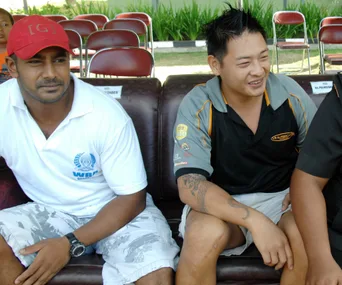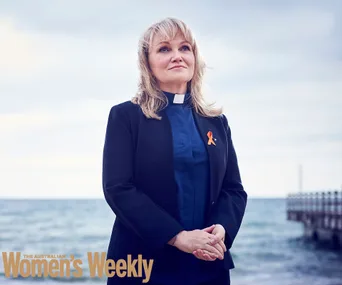On the 12th of January this year, Christie Buckingham crawled into a ball on the sofa and sobbed.
It should have been the 32nd birthday of her friend, convicted drug trafficker Andrew Chan, but he was dead.
She didn’t want to speak with anyone, she didn’t want any consolation.
It was the first time she’d allowed herself a moment to cry since witnessing the brutal execution of Andrew and fellow “Bali Nine ringleader” Myuran Sukumaran last April, and she hoped this outpouring of tears would wash away some of the grief.
“I wept for the waste,” she says. “I wept for the total senselessness of it and the overwhelming feeling of injustice. It’s just too awful.”
Christie was the last person to see the young Australians alive.
The mother of three, a minister at Melbourne’s Bayside Church, had been one of the pastoral carers to the convicted drug traffickers while they were on death row at Bali’s notorious Kerobokan Prison.
When their final appeal for clemency was rejected in January last year, Myuran asked her to be his official witness at the execution.
As the first anniversary of their deaths approaches, Christie has agreed to share intensely painful memories of that night to fulfil a pledge she made to Andrew and Myuran that she’d never give up fighting against the death penalty.
“Every day, Myu made me promise I would speak up and even in his final minutes, when he was chained to the pole waiting to be shot, he made me reiterate my vow. Death by firing squad is so utterly barbaric and it achieves absolutely nothing.
“I was told on the night that if Myu didn’t die instantly, I would have to witness them shooting him in the head. I didn’t know this beforehand; it was my worst nightmare. As a mother, it was so important to me how the family received him back. I couldn’t let them see their son with a bullet in his head and I didn’t want him to have any pain.”
There are two distinct memories that will haunt the petite Irish-born cleric forever: the sound of the shackles rattling as the guards chained the prisoners onto makeshift wooden crucifixes to be shot and the thunderous noise of the 200-strong firing squad leaving the killing fields after the execution (four Nigerians, an Indonesian and a Brazilian were also executed at the time).
“The shooters had 60 seconds to leave the area after firing and I hadn’t given any thought to what that sound would be like, it was terrifying,” she says. “The total silence after they’d gone was something of a strange relief because I knew then that Myu had died instantly.”
How she became involved with the Bali Nine
Christie Buckingham had no intention of becoming involved with the so-called Bali Nine.
In fact, she had zero sympathy for the nine young Australians who were arrested in Bali in April 2005 for attempting to smuggle 8.3 kilograms of heroin from Indonesia into Australia.
She even wrote in her journal at the time, “how dumb can you get and still breathe, nevertheless God, still show your mercy”.
One of Christie’s closest friends from Bible college, Gayle Bonnet-Dwjie had established a church in Bali helping prisoners and the poor.
They had cut their missionary teeth together helping drug addicts on the streets of St Kilda in Melbourne.
Gayle’s church was supporting Australian Schapelle Corby, who was arrested in 2004 for bringing cannabis into Bali, and she asked Christie’s congregation to pray for her, too.
When Christie and her husband, fellow minister Rob, visited Bali for a conference, Gayle invited them to Kerobokan to meet the young Australian prisoners.
“I was reluctant because there was such a media circus around Schapelle,” Christie says, “but niggling me in the back of my mind was the scripture, ‘I was in prison and you visited me’.”
Christie says she instantly knew the boys were rehabilitated.
By that stage, Andrew had established a church inside Kerobokan and Myuran had found his calling teaching English, computer skills and art to others on death row.
As she was leaving, Christie invited them to contact her if there was anything they needed and within two weeks of returning to Australia, a letter arrived from Andrew asking for first-aid supplies, books, pens, pencils and computer equipment, so they could teach the other prisoners English.
“I’ve worked with people in this field for 30 years and I can spot a fake a mile off, and I could see that these two boys were totally reformed and not only did they want to rehabilitate themselves, but others, too,” she says.
Never did Christie imagine, though, that she would be with them the moment they died.
Each of the eight prisoners executed was allowed a spiritual advisor to accompany them, administer last rites, witness their death and sign their death certificates.
When the boys’ final legal appeal was rejected and their death warrant signed, Andrew asked his long-time friend, Salvation Army chaplain, David Soper, to be his witness and Myuran asked Christie to take on that role.
“I could not leave him in his darkest hour,” she says. “I constantly thought about how I would want my son or daughter to be treated and I fixed my mind on that. I had a steely determination that no matter what happened, they were going to be treated with dignity, despite the horrendous situation around them.”
The final farewell
At dusk on the evening of April 29, 2015, Christie and the other witnesses farewelled the prisoner’s families and legal teams at the port of Cilacap, Indonesia, and boarded a small boat to Nusa Kambangan or “execution island” as it is known.
The island of the damned houses 1500 death-row inmates in medieval concrete cells dotted among dense rainforest, rubber plantations and fields of the graves of those who’d already faced their fate.
It is at best inhospitable, at worst utterly gruesome.
Greeted by intense humidity and a haze of mosquitoes, Christie was taken to Myuran’s cell, where she faced the daunting task of calming his mind and soul, while the minutes cruelly ticked down on his life.
The first thing he did was offer her the last of the chocolate he had been given as a final treat.
They prayed, sang, joked and talked until just after midnight, when the guards arrived to take them to the killing field.
As they were marched out of their cells, Andrew led the prisoners in a chorus of Amazing Grace.
It was pitch black, but armed guards held a lantern at her feet so Christie could see where she was going.
“We were down to the last few minutes and with every step I thought to myself, ‘I’m still standing, I’m still breathing, keep going … God, let me be what I need to be for these boys’. Then I heard Andrew in his very ocker Australian accent belt out, “Saviour he can move mountains, my God is mighty to save”, and we all sang back with him and the atmosphere changed instantly.”
Christie was the last chaplain to leave the field.
She refused to go even though she could hear the marksmen lining up their rifles behind her.
She placed her hand on Myuran’s heart and asked if he felt any unforgiveness.
When he said, “No”, she asked if he had any final words. He said, “I want to forgive the people who have to do this.”
The guards tapped Christie on the shoulder, but she refused to go. Behind her the firing squad was lining up the prisoners’ hearts with target lasers.
“I was aware of what was happening behind me, but I hadn’t got Myuran into the spiritual place where I’d promised I’d let him go. I put my hand up and said, ‘One more minute’.” He was chained to the pole on an angle slightly higher than her, so she stood on tippy toes and raised her arm high to block the line of sight so he could not see the lasers dotting his chest.
“We started singing Bless the Lord and I said, ‘Is there anything else you want to say?’ He said, ‘I trust you, Jesus’, and we kept on singing. The guard took me by the arm then, so I said to My very calmly, ‘I’m just going to take one step back, My. Can you still hear me?’ and he said, ‘Yeah, I can hear you’. Then I said, ‘I’m going to take a few steps to the side, My. Can you still hear me?’ and he said, ‘Yeah I can hear you’, and we kept singing. Then I said, ‘I love you. I’ll see you on the other side’.”
As she was walking off, Andrew called to her.
“I rushed to Andrew and put my hand on his heart, and I said, ‘Bless you, Andrew, I love you and I’ll see you on the other side’, and he said, ‘I love you, too, Mrs B. Keep being God’s woman’, which is what he’d always said to me. That moment will stay with me forever.
“I said to them, ‘Keep singing’, so Andrew started to sing again and as I walked off to the side of the field where the other witnesses were, the guard put up a plastic sheet to block our view and they fired. It was an ethereal experience. I felt like I was watching it from the outside, but I was in it. Whilst there was nothing right about their dying, they did everything with such courage.
“I’m reluctant to talk about my grief because mine was not the biggest grief. Their families were so incredibly courageous, under such duress, but equally, they also carried so many people with their courage and spirit.”
The executions that made headlines
The executions and the intense last-minute fight to stave them made headlines around the word.
Thousands rallied against the death penalty and candlelight vigils were held in Australia and overseas. Yet Christie says she was shocked by the level of vitriol pitched towards Andrew and Myuran, and those wanting them to be freed.
“People I’ve never met wrote letters to me, rang me, tweeted me, dropped horrible parcels at my door, like pictures of drug-addicted kids. That stupid line ‘They’ve done the crime, they should do the time’ drives me crazy because that’s exactly what we wanted, that they pay time, not with their life.”
Last May, A few days after returning from Nusa Kambangan, Christie stood at her kitchen bench to light the candles on her youngest daughter’s birthday cake.
She was struck by the surreality of the two worlds she’d been navigating. She paused and stared at the three girls standing in front of her, aged 17, 14 and seven.
Her eldest, Gigi, is nearly the same age as the two youngest Bali Nine drug mules, Scott Rush and Matthew Norman, were when they were arrested.
“It really hit me when I saw my own girls that, at that age, you make good decisions and bad, that comes with being a teenager.
It shouldn’t cost you your life. People deserve second chances. Without second chances, there is no hope. In the words of Andrew Chan, we must keep hope alive.”
This story originally appeared in April, 2016 issue of The Australian Women’s Weekly.





